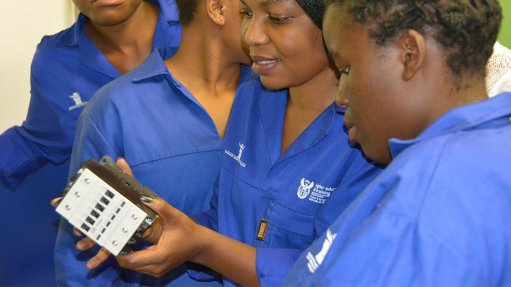Crocodiles are losing their teeth, and angling is to blame
A study of 25 Nile crocodiles in Lake St. Lucia, a World Heritage site in South Africa, found that the highest lead concentrations “ever reported for crocodilians worldwide” was due to the ingestion of fishing weights.
That lead poisoning -- from when the animals scoop up stones from the lake floor to help with digestion -- caused anemia in some of the crocodiles as well as “severe tooth loss,” the researchers from three universities in the country and the South African National Biodiversity Institute said in the study.
“Crocodiles a Lake St. Lucia have some of the highest blood lead concentrations ever recorded in wildlife globally,” Marc Humphries, one of the authors of the report, said in a response to questions. That’s “quite something considering St. Lucia’s conservation and World Heritage status,” he said.
The predatory reptiles, some of which have been alive for decades and can grow to long as 4 m, are part of a population of about 1 000 crocodiles in Lake St. Lucia’s estuarine system. Recreational fishing has taken place in the area since the 1930s, resulting in discarded lead weights building up on the lake bed.
The metal stays in the crocodiles’ bones, making its teeth more fragile -- and lost teeth aren’t replaced. “In severe cases, tooth loss could thus result in nutritional stress and death,” the researchers said.
The crocodiles mostly eat fish, but also prey on antelopes, bush pigs and smaller hippos in the lake.
“There are non-toxic alternatives to lead (steel and tungsten for example) that government and conservation authorities in South Africa should be exploring,” Humphries said. “We continue to allow lead to be used in some of our most important conservation areas.”
Article Enquiry
Email Article
Save Article
Feedback
To advertise email advertising@creamermedia.co.za or click here
Announcements
What's On
Subscribe to improve your user experience...
Option 1 (equivalent of R125 a month):
Receive a weekly copy of Creamer Media's Engineering News & Mining Weekly magazine
(print copy for those in South Africa and e-magazine for those outside of South Africa)
Receive daily email newsletters
Access to full search results
Access archive of magazine back copies
Access to Projects in Progress
Access to ONE Research Report of your choice in PDF format
Option 2 (equivalent of R375 a month):
All benefits from Option 1
PLUS
Access to Creamer Media's Research Channel Africa for ALL Research Reports, in PDF format, on various industrial and mining sectors
including Electricity; Water; Energy Transition; Hydrogen; Roads, Rail and Ports; Coal; Gold; Platinum; Battery Metals; etc.
Already a subscriber?
Forgotten your password?
Receive weekly copy of Creamer Media's Engineering News & Mining Weekly magazine (print copy for those in South Africa and e-magazine for those outside of South Africa)
➕
Recieve daily email newsletters
➕
Access to full search results
➕
Access archive of magazine back copies
➕
Access to Projects in Progress
➕
Access to ONE Research Report of your choice in PDF format
RESEARCH CHANNEL AFRICA
R4500 (equivalent of R375 a month)
SUBSCRIBEAll benefits from Option 1
➕
Access to Creamer Media's Research Channel Africa for ALL Research Reports on various industrial and mining sectors, in PDF format, including on:
Electricity
➕
Water
➕
Energy Transition
➕
Hydrogen
➕
Roads, Rail and Ports
➕
Coal
➕
Gold
➕
Platinum
➕
Battery Metals
➕
etc.
Receive all benefits from Option 1 or Option 2 delivered to numerous people at your company
➕
Multiple User names and Passwords for simultaneous log-ins
➕
Intranet integration access to all in your organisation


















